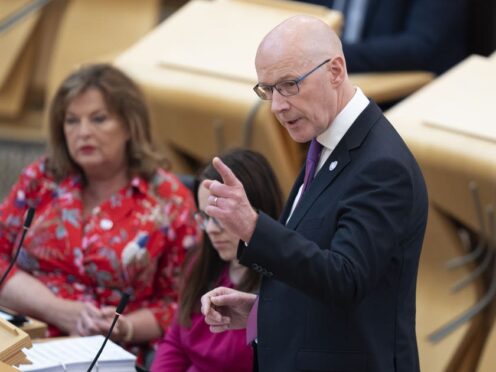John Swinney has suggested the “devastation” that was “wreaked” on Scotland when Margaret Thatcher was prime minister in the 1980s could still be causing problems for the country decades later.
The First Minister was challenged on the Scottish Government’s record on issues such as NHS waiting times, drug and alcohol deaths, and life expectancy, with Conservative leader Douglas Ross claiming Scotland is “stagnating under the SNP”.
Mr Ross hit out at “17 years of decline and broken promises” under the SNP, but Mr Swinney told MSPs some academics believe policies from the 80s could still be having an impact.
He quoted Gerry McCartney, a Glasgow University professor of wellbeing economy, who highlighted there could be “lagged effect from decades ago of urban planning, policy decisions and the 1980s, economic changes” which had then “translated into people’s alcohol deaths a decade or two decades later”.
Mr Swinney said: “I simply put that evidence to Parliament because we have to understand the consequences of the devastation wreaked on our country by the policies of Margaret Thatcher’s Conservative government.”
Mr Ross hit back at the SNP leader, saying he was “blaming the failures here in Scotland now to a period before I was even born and apparently it has nothing to do with the 17 years the SNP have been in charge here in Scotland”.

The Tory, in his last appearance at First Minister’s Questions before stepping down as party leader after next week’s General Election, claimed: “On the SNP’s watch, Scotland’s NHS waiting times are at some of their worst levels ever.
“They have made Scotland the drugs death capital of Europe. Alcohol deaths are now at the highest level for 16 years and life expectancy in Scotland is lower.”
Mr Ross insisted “the SNP are bad for Scotland’s health”, and added: “It is not just our health service the SNP have failed.”
He criticised the Scottish Government for its failure to upgrade key roads, such as the A9 between Perth and Inverness, and said while the SNP had pledged to close the attainment gap it has widened.
He went on to state that while violent crime is up, police officer numbers are down, before accusing the SNP, of having “abandoned” the oil and gas sector with its demand for climate compatibility assessments to be carried out before new developments get the green light.
Mr Ross condemned current and previous SNP leaders and first ministers, saying: “From Salmond to Sturgeon to Swinney, all they have achieved is dividing Scotland.”
He challenged Ms Swinney to “finally draw a line under the independence debate for good”.
Mr Ross said: “We know apart from separating Scotland from the rest of the UK, nothing else matters to John Swinney.
“Independence will always come first, before our NHS, before drugs, before schools, before the economy, before everything.
“Scotland is stagnating under the SNP, we have had 17 years of decline and broken promises.
“Isn’t it time to finally move on from the division of this SNP Government to focus on the issues that really matter to people?”
Responding, Mr Swinney stressed the “priority” the SNP has given to the NHS in Government, saying when the party came to power in 2007 spending on health had accounted for about a third of the Scottish budget – and this has now risen to almost half.
The First Minister said: “That has ensured there is more funding to deal with the increased demand there is in the National Health Service.”
He said Scots are “suffering because of the consequences of 14 years of Conservative austerity” – telling Mr Ross this is “why independence matters”.
Mr Swinney said Scots are also “suffering because of the Conservative obsession with Brexit which is damaging our economy”, and because of “ludicrous” decisions by former Tory PM Liz Truss and her chancellor Kwasi Kwarteng which had “escalated” the cost-of-living crisis.
He insisted: “Independence is the solution to austerity, Brexit and the cost of living, and we’re going to see the back of Douglas Ross as well.
“I don’t really think Douglas Ross is in a position to go on at me about division when his colleagues behind him have told him to get out of office as leader of the Scottish Conservative Party.”
